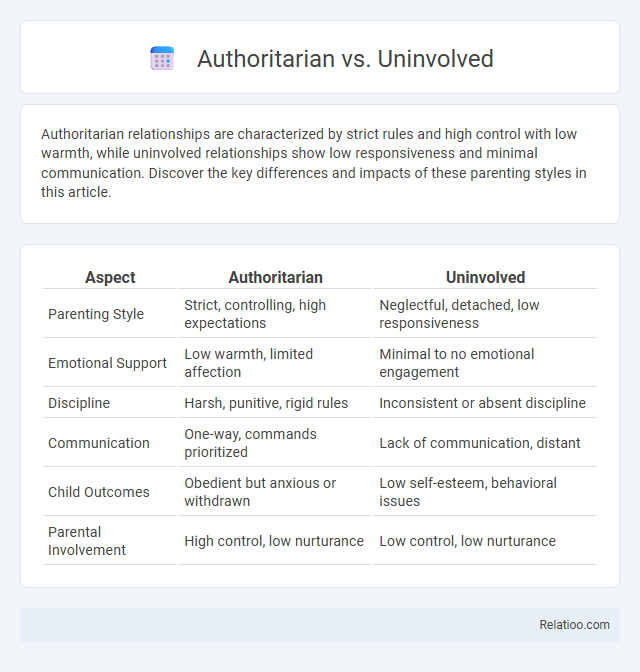Authoritarian relationships are characterized by strict rules and high control with low warmth, while uninvolved relationships show low responsiveness and minimal communication. Discover the key differences and impacts of these parenting styles in this article.
Table of Comparison
| Aspect | Authoritarian | Uninvolved |
|---|---|---|
| Parenting Style | Strict, controlling, high expectations | Neglectful, detached, low responsiveness |
| Emotional Support | Low warmth, limited affection | Minimal to no emotional engagement |
| Discipline | Harsh, punitive, rigid rules | Inconsistent or absent discipline |
| Communication | One-way, commands prioritized | Lack of communication, distant |
| Child Outcomes | Obedient but anxious or withdrawn | Low self-esteem, behavioral issues |
| Parental Involvement | High control, low nurturance | Low control, low nurturance |
Understanding Parenting Styles: Authoritarian vs Uninvolved
Authoritarian parenting is characterized by high demands and low responsiveness, emphasizing strict rules and obedience without warmth, often leading to children who are obedient but less socially competent. Uninvolved parenting shows low responsiveness and low demands, with minimal interaction or guidance, frequently resulting in children who struggle with self-regulation and attachment issues. Understanding the contrast between authoritarian and uninvolved styles highlights the impact of parental control and emotional support on child development outcomes.
Key Characteristics of Authoritarian Parenting
Authoritarian parenting is defined by strict rules, high expectations, and little warmth or nurturing, emphasizing obedience and discipline over open communication. Parents using this style often enforce rigid guidelines with punitive measures, expecting children to comply without question. This approach contrasts with uninvolved parenting, characterized by neglect and lack of responsiveness, and authoritative parenting, which balances firm control with warmth and support.
Defining Uninvolved (Neglectful) Parenting
Uninvolved (Neglectful) parenting is characterized by low responsiveness and low demandingness, resulting in minimal emotional involvement and guidance for the child. This style often leads to developmental issues such as poor social skills and low self-esteem due to the lack of parental support and supervision. Unlike authoritarian parenting, which is high in control but low in warmth, uninvolved parents exhibit indifference and neglect, failing to meet the child's basic emotional and physical needs.
Communication Patterns: Control vs Disengagement
Authoritarian parenting emphasizes strict control and obedience, with communication largely one-sided, where parents dictate rules and expect compliance without explanation. Uninvolved parenting showcases disengagement, characterized by minimal interaction and little emotional involvement or guidance from parents. Your relationship and understanding can be significantly affected by these contrasting patterns, where authoritarian control limits open dialogue, and uninvolved disengagement leads to neglect of your emotional and communicative needs.
Emotional Impact on Children
Authoritarian parenting, characterized by strict rules and high demands, often results in children feeling anxious, less confident, and emotionally withdrawn due to a lack of warmth and open communication. Uninvolved parenting, defined by a lack of responsiveness and neglect, can cause severe emotional insecurity, low self-esteem, and difficulties in forming healthy relationships. Understanding these impacts helps you create a supportive environment that fosters emotional well-being and resilience in your child.
Effects on Academic Performance
Authoritarian parenting, characterized by strict rules and high demands, often leads to lower academic performance due to increased stress and reduced autonomy in students. Uninvolved parenting, marked by neglect and lack of guidance, typically results in poor academic outcomes stemming from lack of support and supervision. In contrast, authoritative parenting, which balances firm expectations with responsiveness, consistently correlates with higher academic achievement as it fosters motivation and self-discipline.
Social Development Outcomes
Authoritarian parenting, characterized by high demands and low responsiveness, often leads to children with lower social competence and increased aggression. Uninvolved parenting, marked by neglect and minimal interaction, results in poor social skills, emotional withdrawal, and higher risks of behavioral problems. Your understanding of these styles highlights that balanced parenting fosters better social development, promoting empathy, cooperation, and healthy relationships.
Long-Term Consequences for Children
Authoritarian parenting, characterized by strict rules and high demands, often leads to children with lower self-esteem and social skills, impacting their long-term emotional development. Uninvolved parenting, marked by neglect and lack of responsiveness, is linked to increased risk of behavioral problems and poor academic performance in children as they grow. Your child's long-term well-being and success are most supported by a balanced approach that fosters both structure and emotional connection.
Cultural Influences on Parenting Approaches
Cultural influences play a significant role in shaping parenting styles such as authoritarian, uninvolved, and permissive approaches. In collectivist cultures, authoritarian parenting may be more prevalent and socially accepted, emphasizing obedience and respect for authority. Your understanding of these cultural contexts can help recognize why certain parenting methods are preferred and how they impact child development outcomes differently across societies.
Supporting Positive Parenting Alternatives
Supporting positive parenting alternatives involves promoting authoritative parenting, which balances high responsiveness with clear expectations, contrasting sharply with authoritarian and uninvolved styles. Authoritarian parenting, characterized by strict rules and low warmth, often leads to increased child anxiety and lower self-esteem. Uninvolved parenting, marked by neglect and minimal interaction, negatively impacts child development, whereas authoritative approaches encourage emotional support and open communication, fostering resilience and social competence.

Infographic: Authoritarian vs Uninvolved
 relatioo.com
relatioo.com